Air Conditioning
Boost Comfort Lower Bills With Energy-Efficient Heat Pumps

We’ve uncovered a revolutionary approach to enhance your comfort while significantly reducing your expenses: energy-efficient heat pumps. These technological wonders effectively move heat to ensure your home is warm in the winter and pleasantly cool in the summer.
With our comprehensive guide, you’ll uncover the secrets behind these efficient machines. Learn how to choose the perfect size, master installation techniques, and unlock the benefits of regular maintenance.
Join us on this energy-saving journey and experience the unparalleled comfort and savings of energy-efficient heat pumps.
Key Takeaways
- Energy-efficient heat pumps reduce energy costs and lower utility bills.
- They are environmentally friendly, consuming less electricity and reducing carbon emissions.
- Properly sizing the heat pump maximizes performance and meets the heating and cooling demands of the home.
- Implementing energy-saving installation tips reduces heat pump energy consumption and saves on energy bills.
The Basics of Energy-Efficient Heat Pumps
Let’s start by understanding the basics of energy-efficient heat pumps.
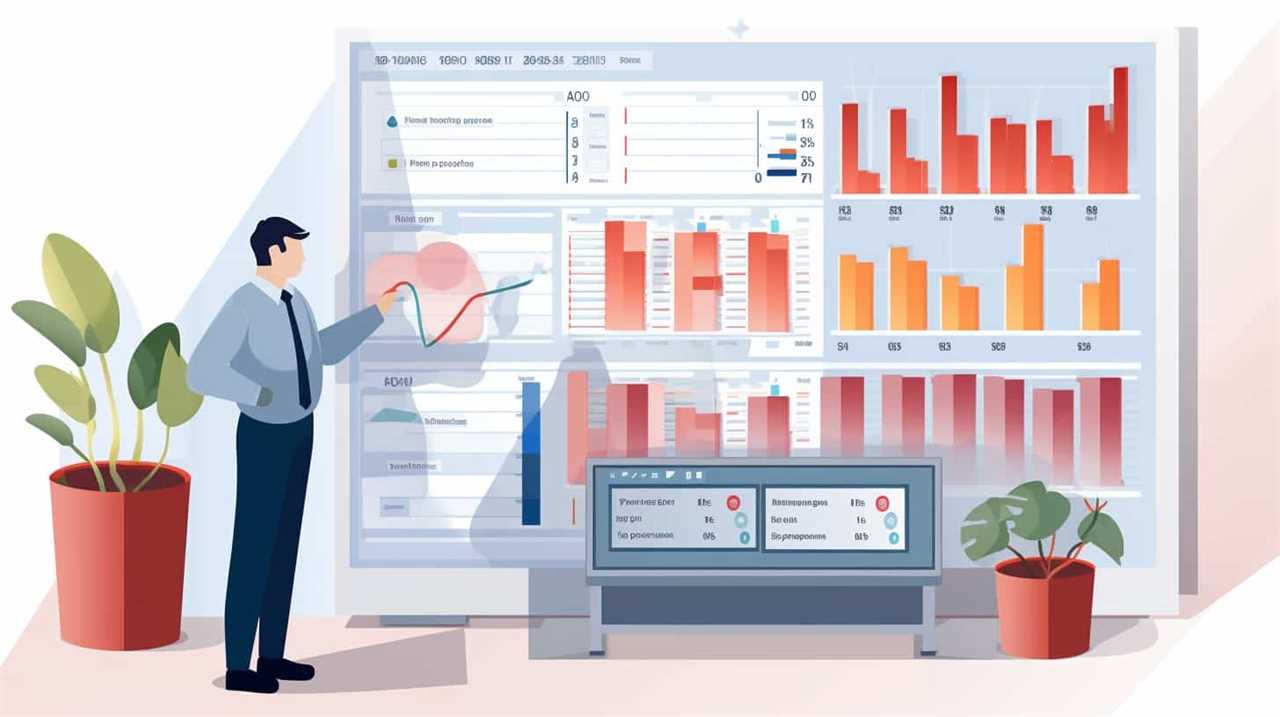
Heat pumps are devices that use electricity to transfer heat from a cool space to a warm space, making the cool space cooler and the warm space warmer.
Heat pump efficiency refers to the amount of heat energy generated compared to the amount of electricity used. Energy-efficient heat pumps have a high efficiency rating, meaning they produce more heat energy while consuming less electricity.
This has several benefits.
Firstly, energy efficient heat pumps can significantly reduce energy costs, resulting in lower utility bills.
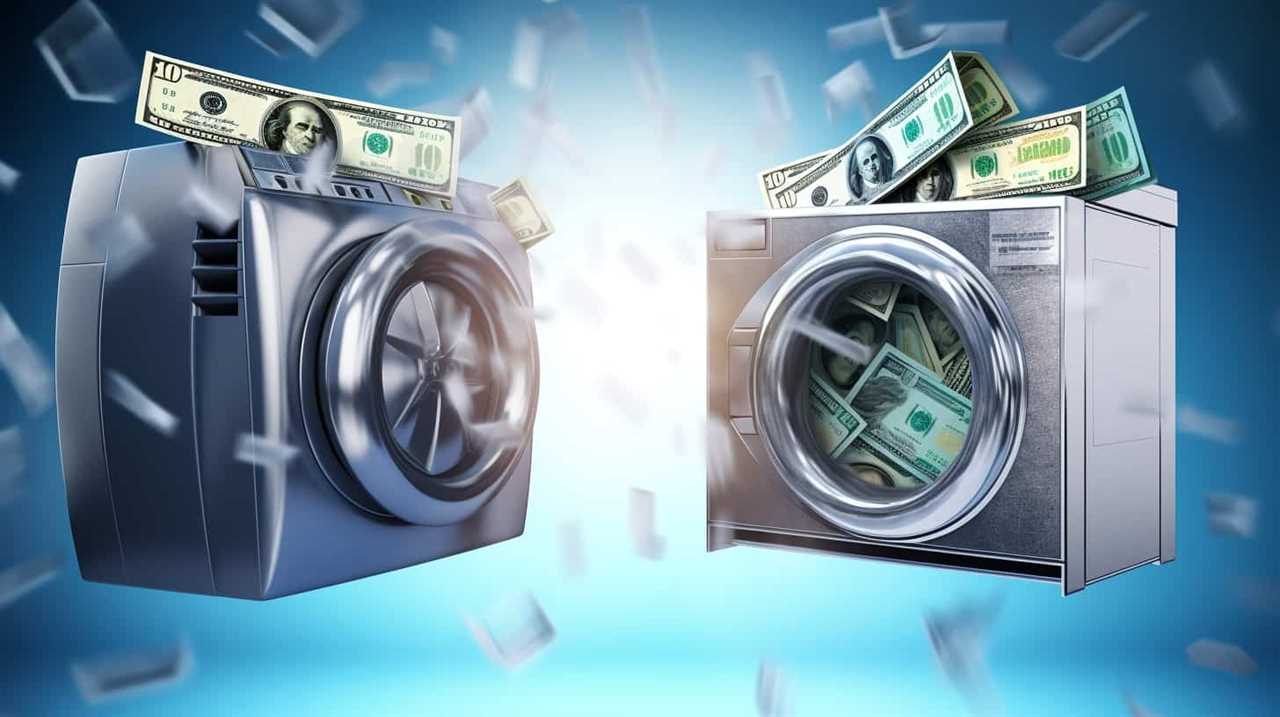
Secondly, they’re environmentally friendly, as they consume less electricity and reduce carbon emissions.
Lastly, they provide consistent and comfortable heating and cooling, ensuring a comfortable indoor environment all year round.
Understanding heat pump efficiency and the benefits of energy-efficient heat pumps is crucial for serving others by providing cost-effective and sustainable heating and cooling solutions.
Understanding the Efficiency Rating of Heat Pumps
To fully understand the efficiency rating of heat pumps, we need to consider the ratio of heat output to electricity input. This rating is commonly referred to as the coefficient of performance (COP). The COP is calculated by dividing the heat output by the electricity input. A higher COP indicates a more efficient heat pump.

When comparing efficiency ratings, it’s important to consider the specific conditions under which the ratings were obtained, as different manufacturers may use different testing methods. Additionally, it’s crucial to note that the efficiency of a heat pump can vary depending on factors such as outdoor temperature and the desired indoor temperature.
To maximize energy savings, it’s recommended to properly size and maintain the heat pump, as well as implement energy-saving tips such as insulating the home and adjusting thermostat settings.
How to Choose the Right Size Heat Pump for Your Home
When selecting the right size heat pump for our home, it’s important to consider factors such as the square footage, insulation levels, and climate conditions. Heat pump sizing is crucial to ensure optimal comfort and energy efficiency.
To calculate the capacity needed, professionals use a formula that takes into account the square footage of the space, the desired temperature difference, and the insulation levels of the home. It’s essential to get an accurate estimate to prevent under or over-sizing, as this can lead to inefficient operation and increased energy consumption.

By properly sizing the heat pump, we can maximize its performance and ensure that it meets the heating and cooling demands of our home.
Now that we understand the importance of choosing the right size, let’s explore how to maximize efficiency with proper heat pump installation.
Maximizing Efficiency With Proper Heat Pump Installation
When it comes to maximizing efficiency with proper heat pump installation, there are several important points to consider.
Optimal installation techniques, such as ensuring proper ductwork and insulation, are crucial for achieving energy savings.

Additionally, following energy-saving installation tips, such as locating the outdoor unit in a shaded area and sealing any air leaks, can further enhance the efficiency of the heat pump system.
Optimal Installation Techniques
We will discuss three optimal installation techniques to maximize efficiency when installing heat pumps. Efficient installation methods are crucial for improving heat pump performance and ensuring optimal energy savings.
Firstly, proper sizing is essential. It’s important to accurately determine the heating and cooling requirements of the space to ensure the heat pump is appropriately sized. An undersized heat pump will struggle to meet the demand, leading to decreased efficiency and increased energy consumption. Conversely, an oversized heat pump may short cycle, leading to inefficient operation and reduced comfort.
Secondly, correct placement of the outdoor unit is crucial. The unit should be installed in a well-ventilated area away from obstructions such as walls or vegetation. This allows for proper air circulation and prevents airflow restrictions, maximizing heat pump performance.

Lastly, ensuring proper refrigerant charge is essential. An improper refrigerant charge can significantly impact the efficiency of the heat pump. It’s crucial to follow manufacturer guidelines and industry standards to achieve the correct charge, optimizing performance and energy efficiency.
Energy-Saving Installation Tips
Our installation tips focus on maximizing efficiency with proper heat pump installation. By following these guidelines, you can reduce heat pump energy consumption and save on your energy bills:
- Set energy-saving thermostat settings to optimize comfort and efficiency.
- Ensure proper insulation in your home to minimize heat loss.
- Seal any air leaks in windows, doors, and ductwork to prevent energy waste.
- Regularly clean and maintain your heat pump to keep it running efficiently.
Implementing these energy-saving installation tips won’t only help you lower your energy bills but also contribute to a more sustainable and environmentally friendly home.
However, it’s important to remember that proper installation is just the first step in maintaining energy efficiency. Regular maintenance is also crucial to ensure your heat pump continues to operate at maximum efficiency.
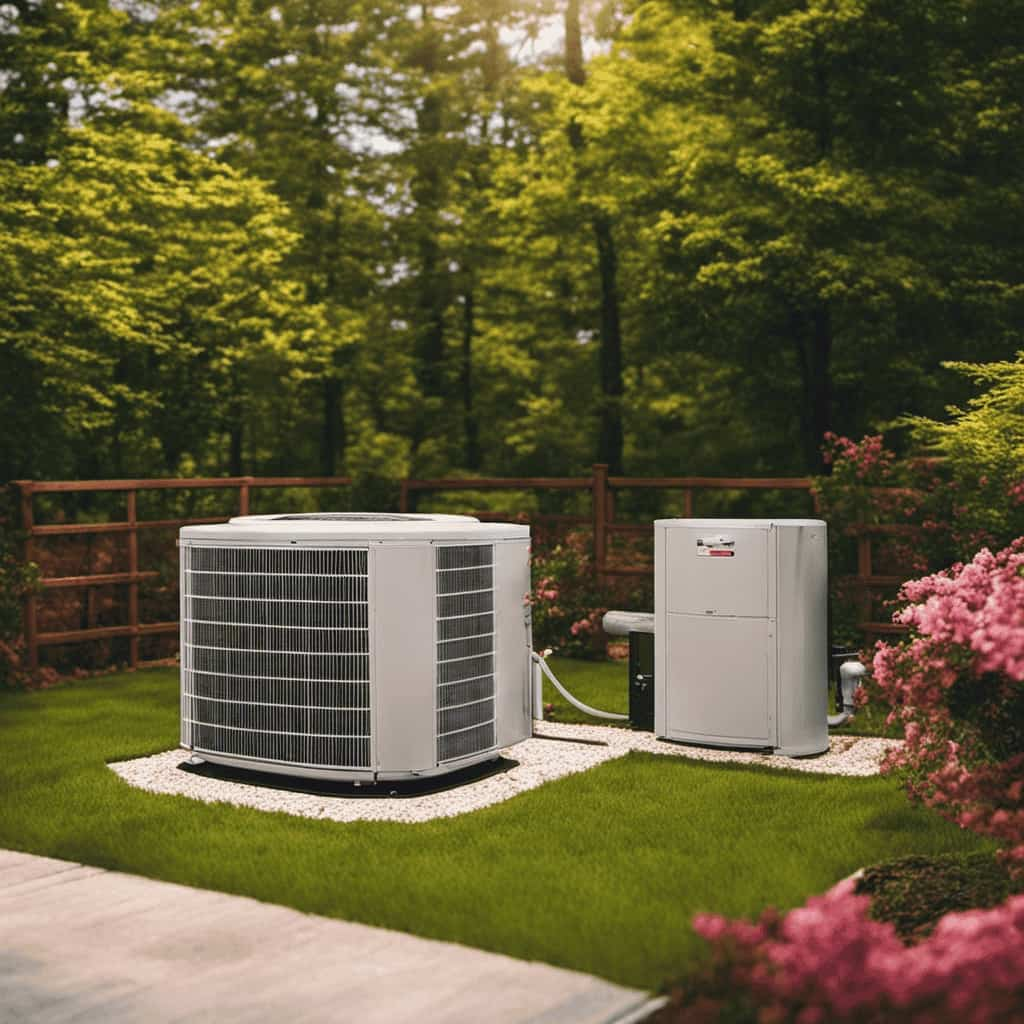
The Benefits of Regular Maintenance for Energy-Efficient Heat Pumps
Regularly maintaining energy-efficient heat pumps can help us maximize their performance and extend their lifespan. The benefits of professional maintenance for these heat pumps are numerous.
First, it ensures that the system operates at its peak efficiency, reducing energy consumption and lowering utility bills.
Professional technicians can also identify and fix minor issues before they become major problems, preventing costly repairs down the line.
Additionally, regular maintenance helps to maintain indoor air quality by keeping the system clean and free from dust and debris.

As for cost-saving maintenance tips, homeowners can clean or replace air filters regularly, check and clean the outdoor unit, and schedule annual professional maintenance visits.
By following these tips and investing in professional maintenance, we can enjoy the full benefits of our energy-efficient heat pumps.
Now, let’s compare energy-efficient heat pumps to traditional HVAC systems.
Energy-Efficient Heat Pumps Vs. Traditional HVAC Systems
When comparing energy-efficient heat pumps to traditional HVAC systems, there are several key differences to consider.
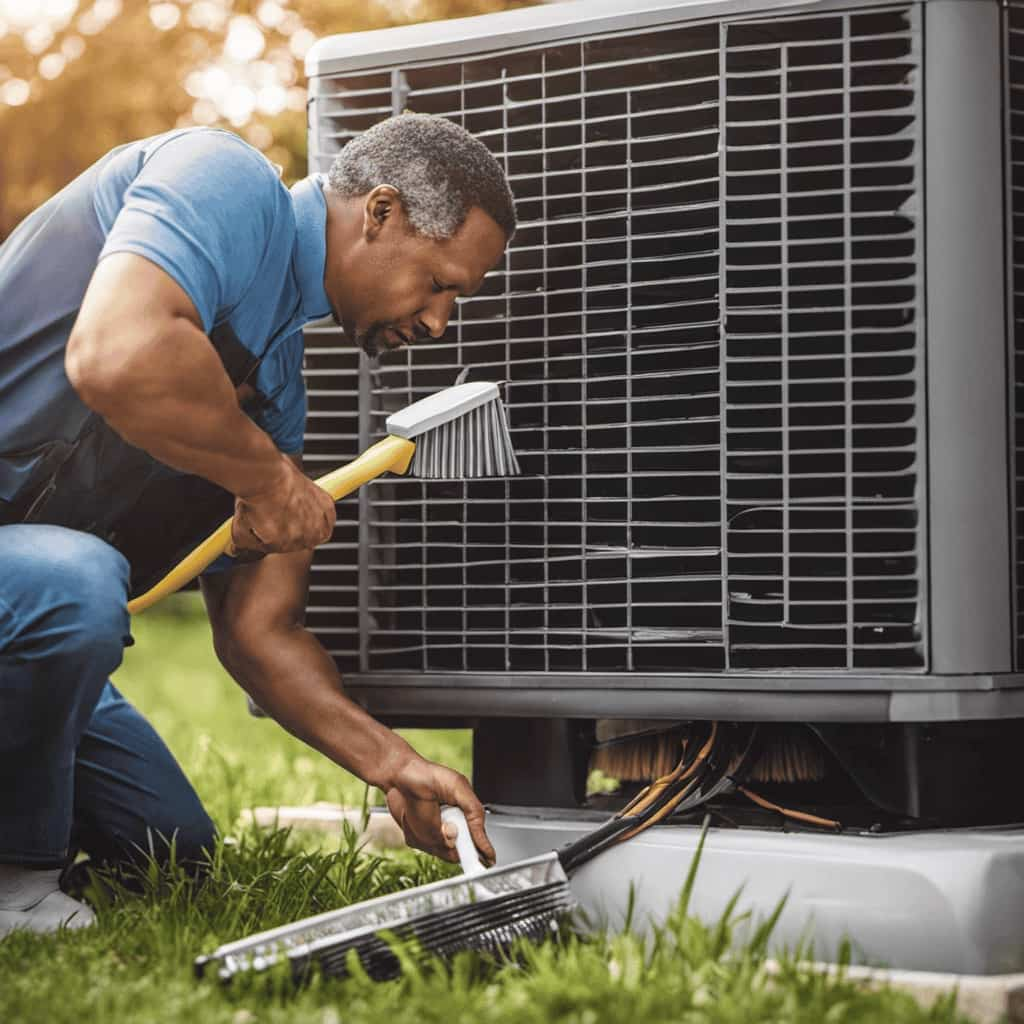
-
Energy Savings: Energy-efficient heat pumps use less electricity to heat or cool a space, resulting in lower energy bills for homeowners. Traditional HVAC systems, on the other hand, can be less efficient and consume more energy, leading to higher costs.
-
Environmental Impact: Energy-efficient heat pumps are designed to be more environmentally friendly, as they produce fewer greenhouse gas emissions compared to traditional HVAC systems. This means that by choosing an energy-efficient heat pump, homeowners can reduce their carbon footprint and contribute to a cleaner and greener environment.
-
Improved Comfort: Energy-efficient heat pumps provide consistent and comfortable heating and cooling throughout the year. They can maintain a constant temperature, adjusting to the needs of the occupants. Traditional HVAC systems may struggle to maintain a consistent temperature, resulting in hot or cold spots in the home.
-
Long-term Savings: While energy-efficient heat pumps may have a higher upfront cost compared to traditional HVAC systems, they offer long-term savings through reduced energy consumption and lower utility bills. Over time, these savings can offset the initial investment, making energy-efficient heat pumps a cost-effective choice.
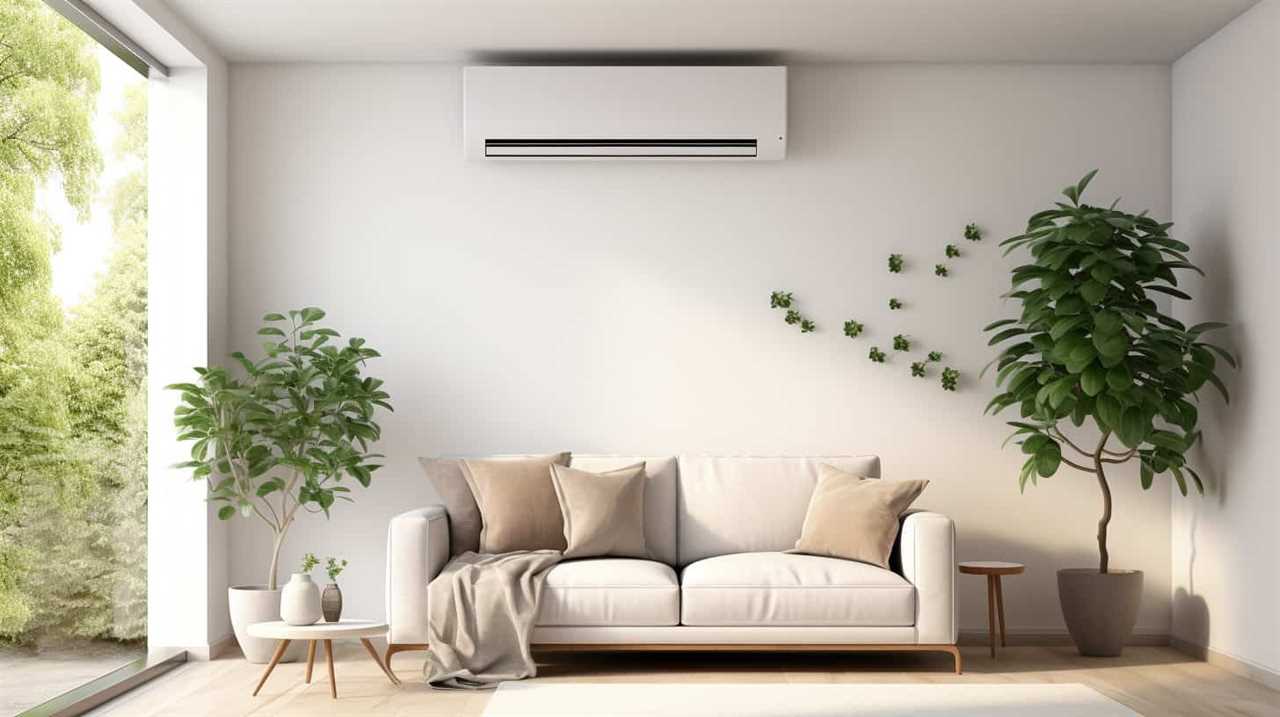
Tips for Optimizing Heat Pump Performance and Energy Savings
When it comes to optimizing heat pump performance and achieving energy savings, there are several important points to consider.
First, adjusting the temperature settings for efficiency can have a significant impact on energy consumption.
Regular maintenance and cleaning of the heat pump is also crucial to ensure optimal performance.
Additionally, investing in insulation and weatherproofing can help prevent heat loss and improve overall energy efficiency.

Temperature Settings for Efficiency
To maximize heat pump performance and save energy, we recommend adjusting the temperature settings based on your comfort needs. Here are some energy-saving tips for temperature control:
-
Set the thermostat to a moderate temperature: Keeping your heat pump at a moderate temperature, around 68°F (20°C) during the winter and 78°F (25°C) during the summer, can help save energy without sacrificing comfort.
-
Use programmable thermostats: Programmable thermostats allow you to set different temperatures for different times of the day, so you can avoid heating or cooling an empty house.
-
Take advantage of natural heating and cooling: Open curtains during the day to let sunlight warm your home, and close them at night to retain heat. In the summer, use blinds or shades to block out the sun’s heat.
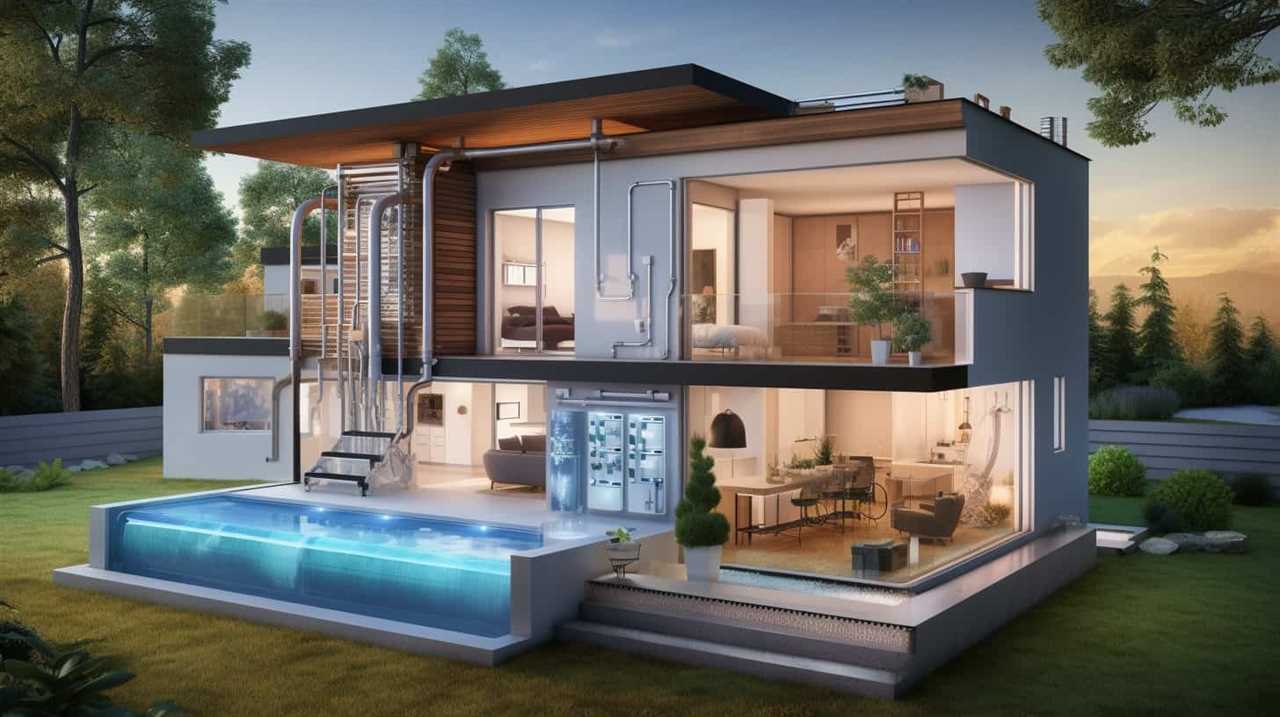
-
Consider zoning systems: Zoning systems allow you to control the temperature in different areas of your home independently, maximizing comfort and energy savings.
Regular Maintenance and Cleaning
We recommend performing regular maintenance and cleaning on your heat pump to ensure optimal performance and energy savings.
Regular maintenance includes inspecting and cleaning the air filters every one to three months. Dirty filters can restrict airflow and decrease efficiency.
It’s also important to clean the outdoor unit regularly by removing any debris, such as leaves or grass clippings, that may obstruct airflow. Additionally, check the fins on the outdoor unit for any signs of damage and straighten them if necessary.

Cleaning techniques for the indoor unit include wiping down the evaporator coils with a soft cloth and cleaning the condensate drain to prevent clogs.
Insulation and Weatherproofing
Our insulation and weatherproofing measures will help optimize heat pump performance and energy savings. By implementing effective insulation techniques and using high-quality weatherproofing materials, we can ensure that your heat pump operates at its highest efficiency.
Here are some key measures to consider:
- Insulate your walls, floors, and ceilings to minimize heat loss and gain.
- Seal any air leaks around windows, doors, and electrical outlets to prevent drafts.
- Use weatherstripping and caulking to seal gaps in windows and doors.
- Install insulation around your heat pump system to reduce heat transfer.
These measures work together to create a well-insulated and weatherproofed environment, allowing your heat pump to operate optimally and saving you energy and money.

Exploring Advanced Features of Energy-Efficient Heat Pumps
Advanced features of energy-efficient heat pumps can significantly enhance the comfort and efficiency of our home heating and cooling system. These advanced control features allow for precise temperature control, ensuring that our home is always at the perfect temperature.
With smart home integration, we can conveniently control our heat pump remotely through our smartphones or other smart devices. This means we can adjust the temperature, set schedules, and monitor energy usage even when we’re not at home.
Additionally, some heat pumps come with advanced sensors and algorithms that can detect occupancy and adjust the heating or cooling accordingly, optimizing energy efficiency. These features not only provide us with greater control and convenience but also help to further reduce our energy consumption and lower our bills.
Now, let’s address some common myths and misconceptions about energy-efficient heat pumps.

Common Myths and Misconceptions About Energy-Efficient Heat Pumps
Are there any common myths and misconceptions about energy-efficient heat pumps?
Let’s address some of the most prevalent ones and provide accurate information to dispel these misconceptions.
-
Myth 1: Heat pumps are only effective in warm climates.
-
Myth 2: Heat pumps aren’t suitable for cold climates.
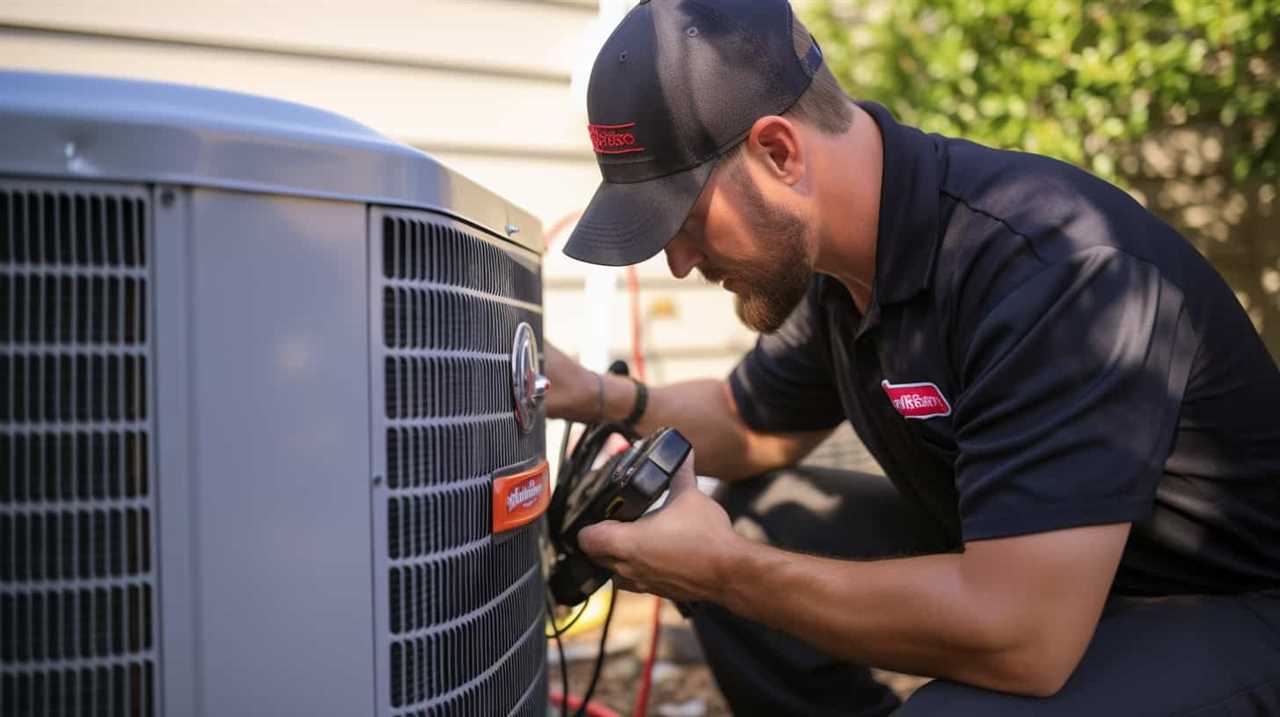
-
Myth 3: Heat pumps are expensive to install and maintain.
-
Myth 4: Heat pumps consume more energy than traditional heating systems.
In reality, energy-efficient heat pumps are versatile and can operate effectively in both warm and cold climates. They can extract heat from the air, ground, or water sources, making them suitable for various regions.
While the initial installation cost may be higher than traditional systems, the long-term energy savings can offset this expense. Additionally, modern heat pumps have advanced technology that ensures energy efficiency, resulting in lower utility bills.

Government Incentives and Rebates for Energy-Efficient Heat Pumps
When it comes to energy-efficient heat pumps, government incentives and rebates can provide significant financial benefits.
These incentives are designed to encourage homeowners to upgrade their heating systems to more energy-efficient options, helping to reduce energy consumption and lower utility bills.
However, it’s important to note that eligibility criteria may vary, so it’s crucial to research and understand the specific requirements to take advantage of these incentives and rebates.
Financial Benefits of Incentives
We can save money by taking advantage of government incentives and rebates for energy-efficient heat pumps. Here are some financial benefits that come with these incentives:

- Financial savings: By installing an energy-efficient heat pump, you can significantly reduce your monthly energy bills. These heat pumps are designed to consume less energy while still providing efficient heating and cooling.
- Return on investment: Investing in an energy-efficient heat pump can provide long-term financial benefits. The initial cost of the heat pump may be higher, but the energy savings over time can help you recoup your investment.
Government incentives: Many governments offer incentives and rebates to encourage the adoption of energy-efficient technologies. These incentives can help offset the cost of purchasing and installing an energy-efficient heat pump.
- Environmental impact: By opting for an energy-efficient heat pump, you’re not only benefiting financially but also contributing to a greener future by reducing your carbon footprint.
Taking advantage of these incentives can help make energy-efficient heat pumps more affordable and provide a positive impact on both your finances and the environment.
Eligibility Criteria for Rebates
To determine if you qualify for government incentives and rebates for energy-efficient heat pumps, it’s essential to review the eligibility criteria. These criteria vary depending on your location and the specific program you’re applying for. However, here are some common requirements to consider before submitting your rebate application:
-
Energy Star Certification: Most rebate programs require the heat pump to be Energy Star-certified, ensuring its energy efficiency.
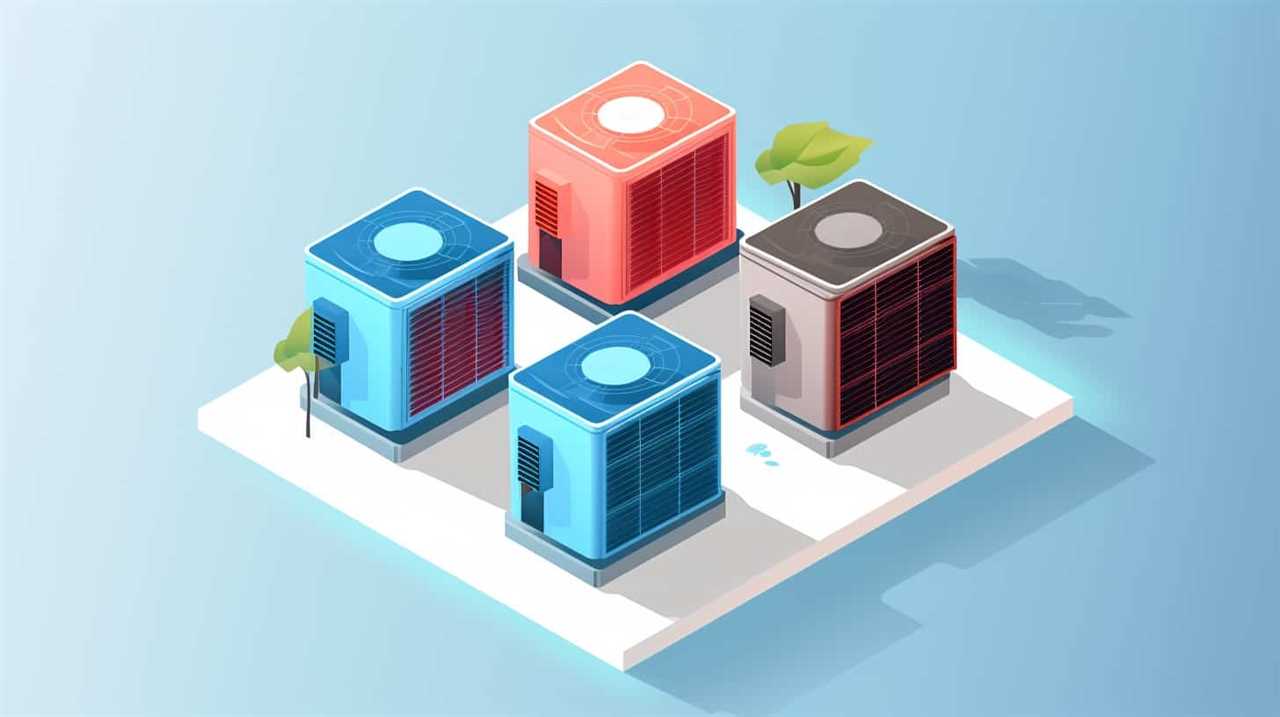
-
Professional Installation: The heat pump should be installed by a licensed professional to ensure proper functioning and energy savings.
-
Minimum Efficiency Ratings: Rebate programs often have minimum efficiency requirements, such as Seasonal Energy Efficiency Ratio (SEER) or Heating Seasonal Performance Factor (HSPF) ratings.
-
Rebate Processing: After submitting your rebate application, it will go through a processing period to verify eligibility and ensure all required documentation is provided.
The Future of Energy-Efficient Heat Pump Technology
The future of energy-efficient heat pump technology holds immense potential for revolutionizing the way we heat and cool our homes. As advancements continue to be made, we can expect to see significant improvements in heat pump technology that will have a positive impact on both our comfort and the environment.
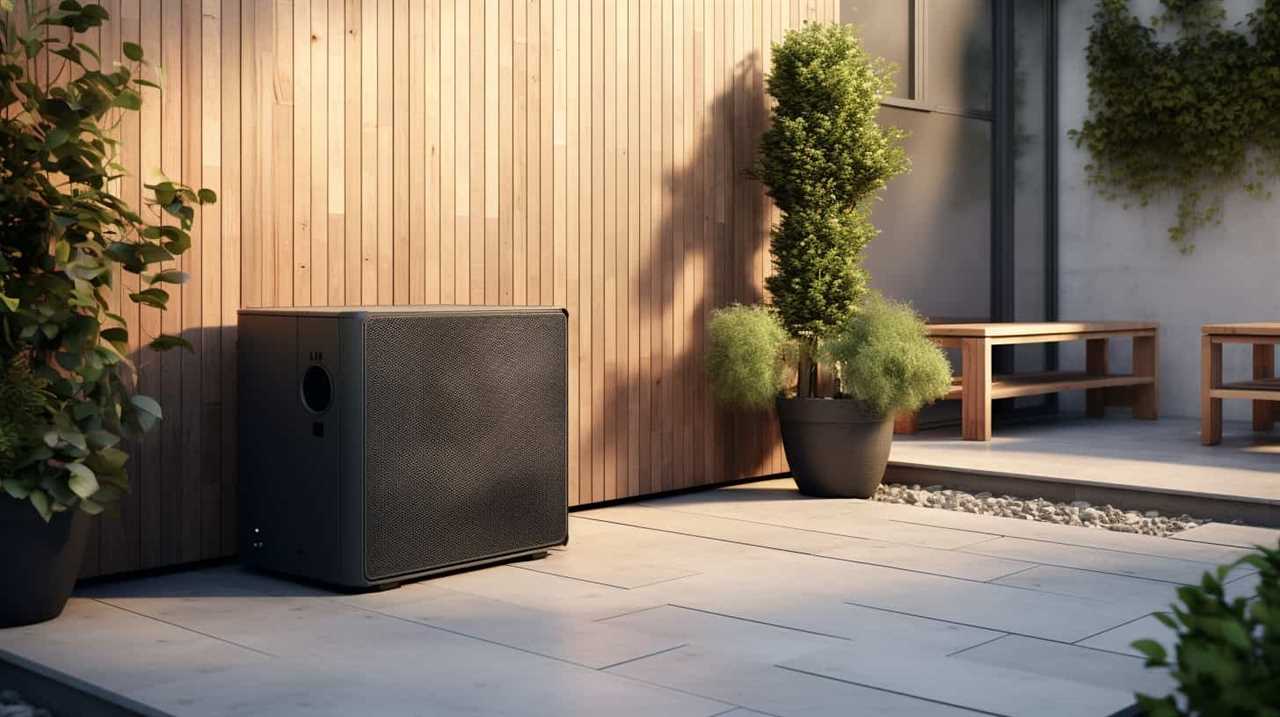
Here are some key developments to look forward to:
- Increased energy efficiency: New heat pump models will be designed to operate even more efficiently, reducing energy consumption and lowering utility bills.
- Enhanced environmental friendliness: Heat pumps will utilize refrigerants with lower global warming potential, minimizing their impact on the environment.
- Smarter control systems: Advanced automation and control features will allow homeowners to optimize their heat pump’s performance and energy usage.
- Integration with renewable energy sources: Heat pumps will be seamlessly integrated with renewable energy systems, such as solar panels, to further reduce reliance on fossil fuels.
With these advancements, the future of energy-efficient heat pump technology promises a greener and more comfortable future for all.
Frequently Asked Questions
How Much Money Can I Expect to Save on My Energy Bills by Using an Energy-Efficient Heat Pump?
We can expect to save a significant amount of money on our energy bills by using an energy-efficient heat pump. The return on investment is high due to the energy savings achieved.
Are There Any Tax Credits or Financial Incentives Available for Installing an Energy-Efficient Heat Pump?
Yes, there are tax credits and financial incentives available for installing energy-efficient heat pumps. These incentives can help offset the cost of the installation and make it more affordable for homeowners like us.
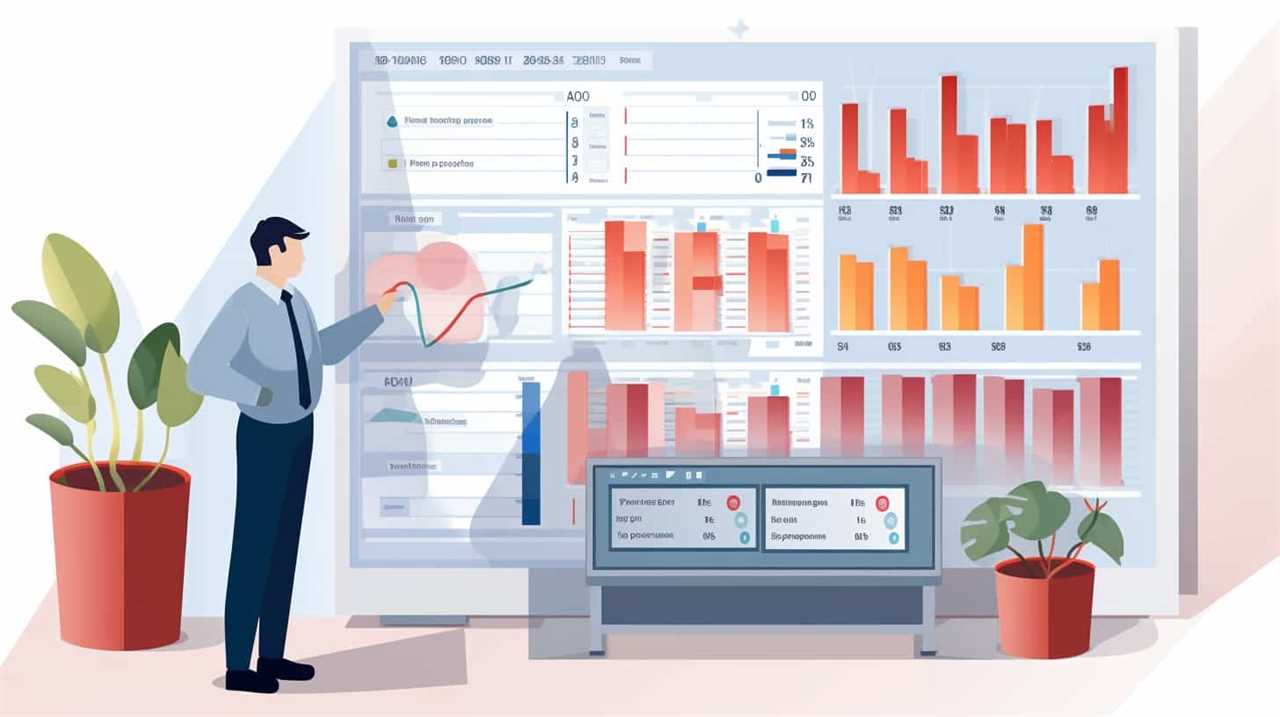
Can I Use an Energy-Efficient Heat Pump in a House With an Existing Ductwork System?
Yes, you can use an energy-efficient heat pump in a house with an existing ductwork system. The installation process involves assessing compatibility and making necessary adjustments to ensure efficient operation and maximum comfort.
How Long Does the Installation Process Typically Take for an Energy-Efficient Heat Pump?
The installation process for energy-efficient heat pumps typically takes a few days. However, the benefits they provide, such as improved comfort and lower energy bills, are worth the wait.
Are There Any Specific Maintenance Tasks That I Need to Perform Regularly to Ensure the Optimal Performance of My Energy-Efficient Heat Pump?
Regular maintenance tasks are essential for ensuring the optimal performance of our energy-efficient heat pumps. By performing tasks such as cleaning or replacing filters, checking refrigerant levels, and inspecting electrical connections, we can maximize efficiency and extend the lifespan of our heat pumps.
Conclusion
In conclusion, energy-efficient heat pumps offer a cost-effective and comfortable solution for heating and cooling homes. By understanding the efficiency rating and choosing the right size heat pump, homeowners can maximize energy savings. Proper installation, regular maintenance, and exploring advanced features further enhance efficiency.
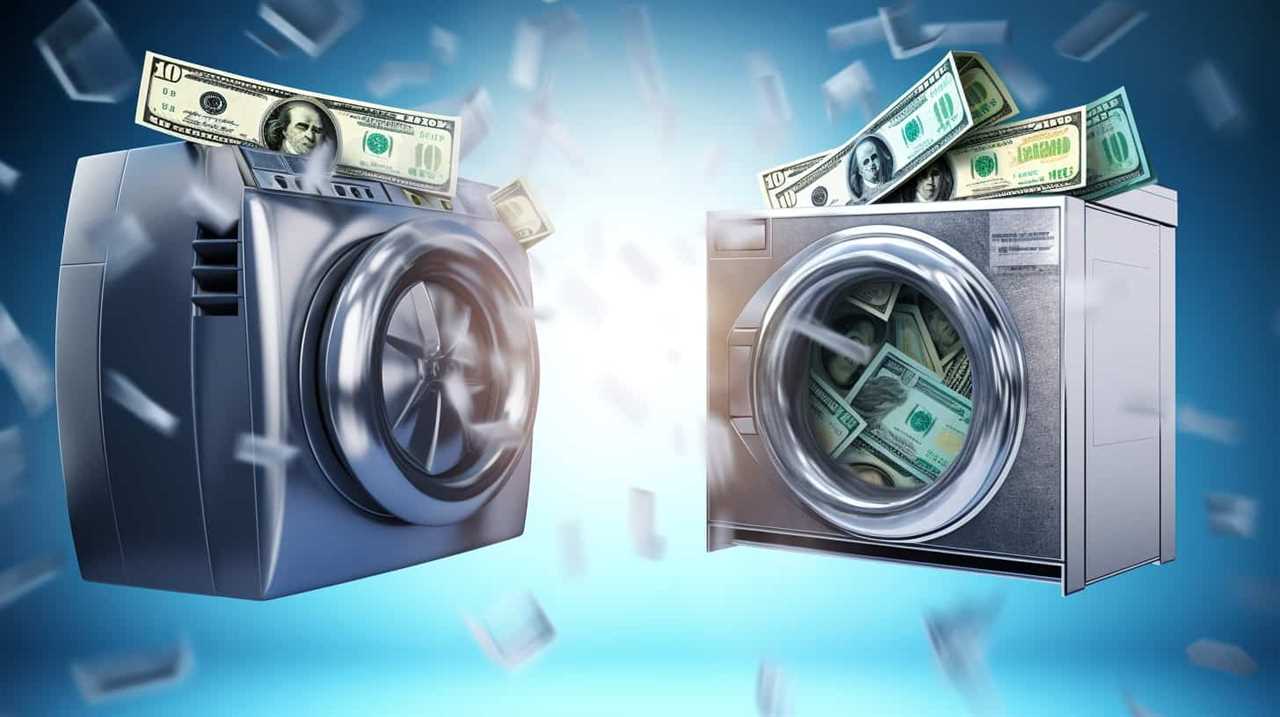
Contrary to common misconceptions, energy-efficient heat pumps are reliable and effective. Additionally, government incentives and rebates make them an even more attractive option.
As technology continues to advance, the future of energy-efficient heat pump technology looks promising.
Air Conditioning
Renewable Energy: Revolutionizing Heat Pump Performance

We have seen an incredible change in heat pump performance worldwide. The incorporation of renewable energy sources has transformed the efficiency and effectiveness of these systems.
In fact, studies have shown that by incorporating renewable energy, heat pump performance can be enhanced by up to 40%. This statistic alone highlights the immense potential and impact of renewable energy in the realm of heat pumps.
In this article, we will explore the advantages, technologies, and successful applications of this groundbreaking innovation. Get ready to master the future of renewable energy and heat pump performance.
Key Takeaways
- Incorporating renewable energy can enhance heat pump performance by up to 40%.
- Tapping into geothermal energy allows heat pumps to achieve higher efficiencies and reduce reliance on traditional energy sources.
- Integrating renewable energy reduces reliance on fossil fuels and decreases greenhouse gas emissions.
- Variable speed compressors and thermal storage systems are key technologies for enhancing heat pump efficiency with renewable energy.
The Role of Renewable Energy in Heat Pump Performance
In our article, we’ll explore the role of renewable energy in revolutionizing heat pump performance.
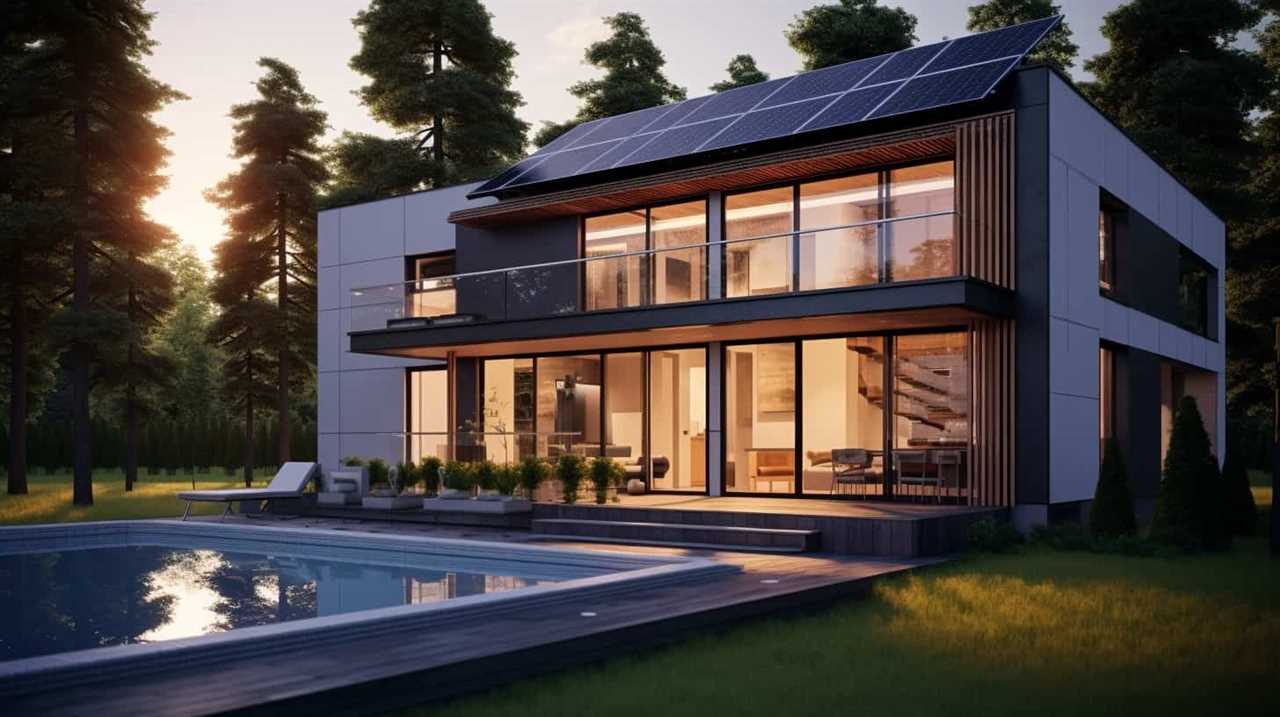
One key aspect is the utilization of geothermal energy, which plays a crucial role in enhancing heat pump performance. Geothermal energy harnesses the heat stored within the Earth, providing a consistent and renewable source of power for heat pumps. By tapping into this energy, heat pumps can achieve higher efficiencies and reduce their reliance on traditional energy sources.
Another significant factor is the impact of solar energy on heat pump efficiency. Solar energy, through the use of photovoltaic panels, can power heat pumps directly, enabling them to operate without drawing electricity from the grid. This integration of solar energy further enhances the overall performance and sustainability of heat pumps.
As we delve into the advantages of integrating renewable energy with heat pumps, these aspects will become even more apparent.
Advantages of Integrating Renewable Energy With Heat Pumps
How can integrating renewable energy with heat pumps benefit us?

The integration of renewable energy with heat pumps offers several advantages, making it a compelling option for optimizing heat pump performance. By harnessing renewable energy sources such as solar or wind power, we can significantly reduce our reliance on fossil fuels and decrease greenhouse gas emissions. This not only contributes to a more sustainable and environmentally friendly energy system but also helps to combat climate change.
Additionally, integrating renewable energy with heat pumps can lead to cost savings by reducing energy consumption and lowering utility bills. Moreover, renewable energy integration allows for better control and flexibility in managing energy supply and demand, leading to improved overall system efficiency.
These benefits highlight the potential of combining renewable energy and heat pumps to create a more efficient and sustainable heating and cooling solution.
In the next section, we’ll explore key technologies for enhancing heat pump efficiency with renewable energy.

Key Technologies for Enhancing Heat Pump Efficiency With Renewable Energy
By utilizing advanced technologies and incorporating renewable energy sources, we can significantly enhance the efficiency of heat pumps. In renewable energy applications, heat pump optimization plays a crucial role in achieving higher performance levels.
One key technology for enhancing heat pump efficiency is the use of variable speed compressors. These compressors allow for precise control of the heat pump’s operation, adjusting the speed and capacity according to the heating or cooling demand. By matching the output to the required load, energy wastage is minimized, resulting in improved efficiency.
Another technology is the integration of thermal storage systems. These systems store excess thermal energy generated by the heat pump during periods of low demand and release it during peak demand, reducing the need for the heat pump to operate at full capacity.
Furthermore, advanced control algorithms and sensors can optimize the heat pump’s operation by continuously monitoring and adjusting parameters such as temperature, pressure, and airflow.

These technologies, when combined with renewable energy sources, can revolutionize heat pump performance, making them a key component in achieving sustainable and efficient heating and cooling systems.
Case Studies: Successful Applications of Renewable Energy in Heat Pump Systems
We frequently encounter successful applications of renewable energy in heat pump systems, showcasing their effectiveness and potential for widespread adoption. These case studies provide real-world examples of how renewable energy can be integrated into heat pump systems to achieve significant energy savings and reduce carbon emissions.
| Case Study | Description |
|---|---|
| Residential Building | A residential building in a cold climate utilized a ground source heat pump system with geothermal energy. This system was able to provide heating and cooling for the entire building while reducing energy consumption by 50%. |
| Industrial Facility | An industrial facility implemented an air-to-water heat pump system with solar thermal panels. This system was able to meet the facility’s heating and hot water demands while reducing energy costs by 40%. |
| Commercial Complex | A commercial complex installed an air-source heat pump system with rooftop solar panels. This system provided heating and cooling for the complex, resulting in a 30% reduction in energy consumption and significant cost savings. |
These successful case studies demonstrate the feasibility and benefits of incorporating renewable energy into heat pump systems, making them a viable solution for achieving sustainable and efficient heating and cooling in various applications.
Future Prospects: Innovations and Trends in Renewable Energy for Heat Pumps
As we look ahead, the future prospects for renewable energy in heat pumps show promising innovations and emerging trends. The advancements in renewable energy for heat pumps are driving the industry towards a more sustainable and efficient future.

Here are four key areas where we see significant developments:
-
Integration of Energy Storage:
With the increasing availability and declining costs of batteries, integrating energy storage systems with heat pumps is becoming more feasible. This allows for better utilization of renewable energy sources and increased flexibility in managing energy demand. -
Smart Grid Integration:
The integration of heat pumps with smart grid technologies enables demand response and grid optimization. By leveraging real-time data and advanced control algorithms, heat pumps can be operated more efficiently and contribute to a more resilient and reliable grid. -
Hybrid Systems:
Combining heat pumps with other renewable energy technologies, such as solar thermal or geothermal, can enhance their performance and overall energy efficiency. These hybrid systems offer the potential for higher energy savings and reduced carbon emissions.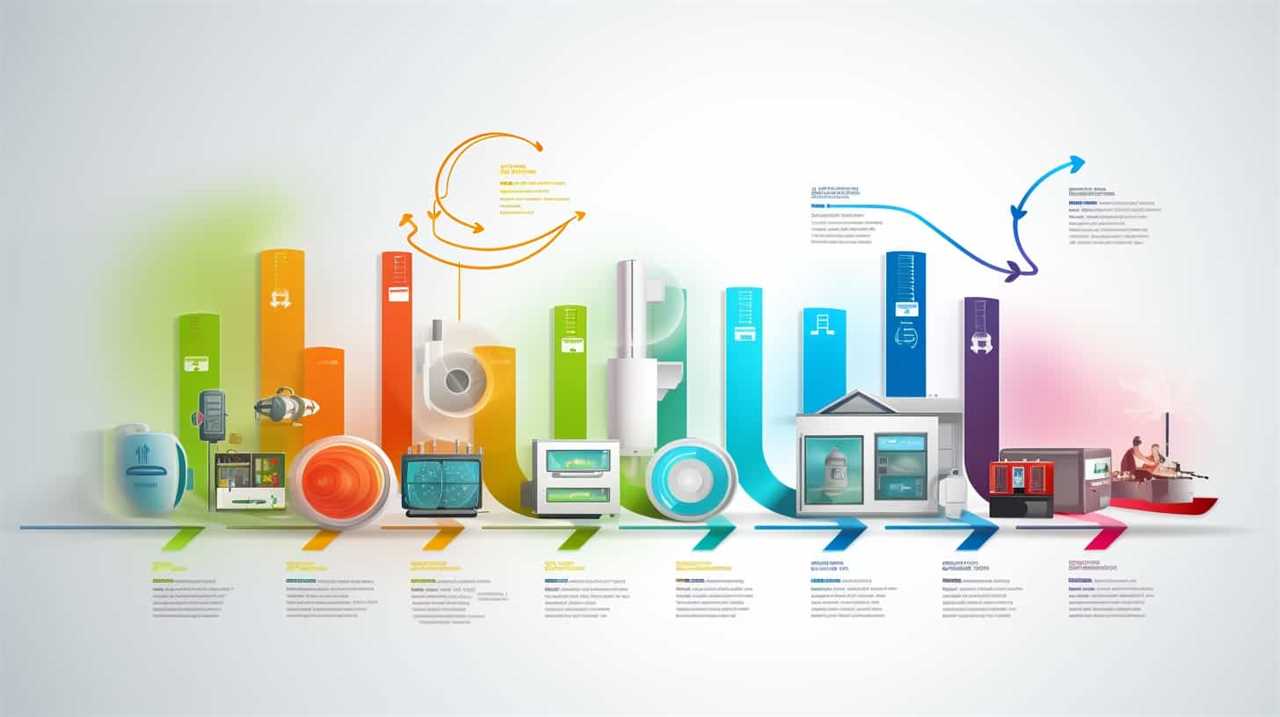
-
Heat Pump Electrification:
As the electricity sector transitions to renewable sources, electrifying heat pumps becomes an attractive option. This trend opens up new market opportunities for renewable energy in the heat pump industry, with the potential to significantly reduce greenhouse gas emissions.
These emerging technologies and market opportunities are paving the way for a greener and more sustainable future for heat pumps. By embracing these innovations and trends, we can revolutionize the performance and impact of renewable energy in the heat pump sector.
Frequently Asked Questions
How Do Heat Pumps Work and What Is Their Role in Renewable Energy Systems?
Heat pump technology utilizes the transfer of heat from one place to another, providing efficient heating and cooling. Its role in renewable energy systems lies in its ability to extract heat from renewable sources, reducing reliance on fossil fuels and lowering carbon emissions.
What Are the Main Advantages of Integrating Renewable Energy Sources With Heat Pumps?
What are the main advantages of integrating renewable energy sources with heat pumps? By combining renewable energy with heat pumps, we maximize energy efficiency, reduce carbon emissions, and contribute to a sustainable future.

What Are Some Key Technologies That Can Enhance the Efficiency of Heat Pumps When Combined With Renewable Energy?
Energy efficient technologies, such as advanced compressors and smart controls, can significantly enhance the efficiency of heat pumps when combined with renewable energy sources. These innovations optimize performance and maximize the utilization of clean, sustainable energy.
Can You Provide Any Real-Life Examples of Successful Applications of Renewable Energy in Heat Pump Systems?
Real-life case studies showcase the benefits and challenges of incorporating renewable energy into heat pump systems. One example is the successful application of geothermal heat pumps in residential buildings, reducing energy consumption and carbon emissions.
What Are the Current and Future Innovations and Trends in Renewable Energy for Heat Pumps?
Innovations in heat pump technology and future trends in renewable energy for heat pumps are shaping the way we maximize efficiency and reduce emissions. We explore the latest advancements and upcoming developments in this field.
Conclusion
In conclusion, the integration of renewable energy with heat pump systems has revolutionized their performance, offering numerous advantages and enhancing efficiency. This combination of technologies has proven successful in various case studies, showcasing its potential for widespread implementation.
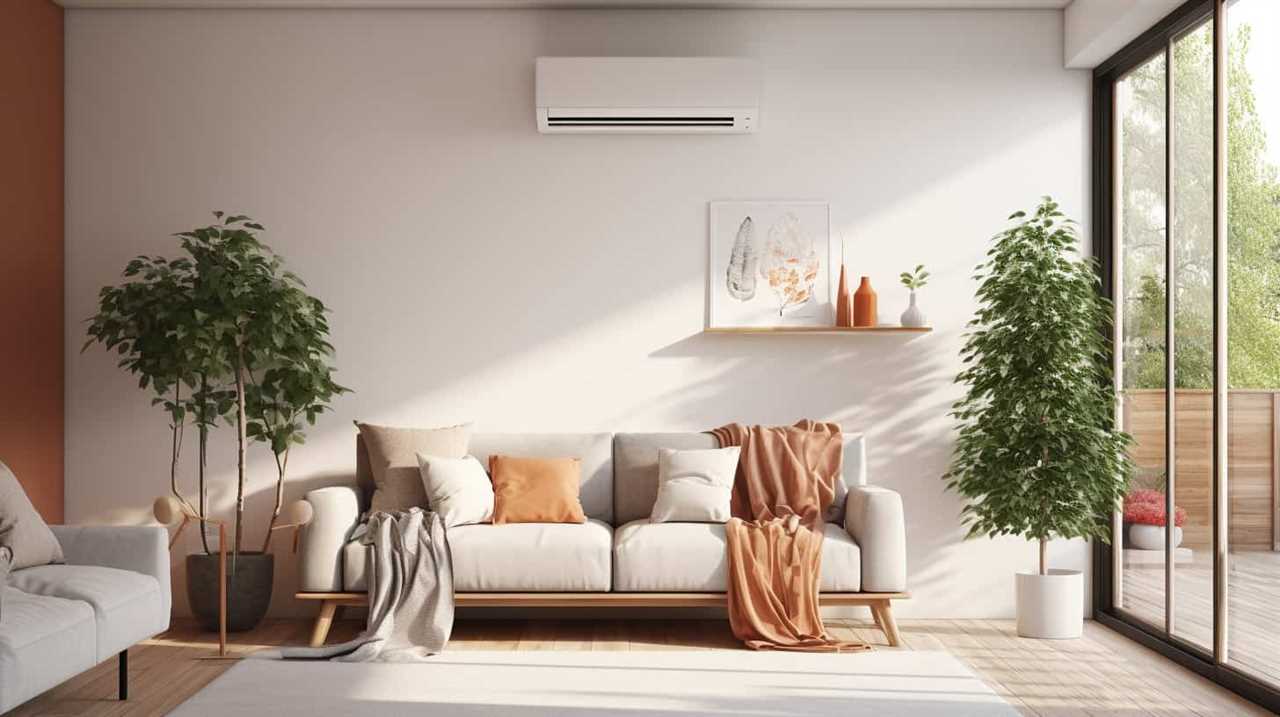
As innovations continue to emerge, the future prospects for renewable energy in heat pumps are promising. By harnessing the power of renewable sources, we can achieve sustainable and cost-effective heating solutions, paving the way for a greener and more efficient future.
Remember, ‘Innovation is the key to unlocking a sustainable future.’
Air Conditioning
Understanding Energy-Efficient Heat Pumps for Green Homes

We have all the information on energy-efficient heat pumps for environmentally friendly homes. These sustainable systems are top-notch when it comes to heating and cooling while also benefiting the planet.
In this article, we’ll break down how these pumps work, what to consider when choosing one, and the different types available. Plus, we’ll share tips on maximizing energy savings through proper maintenance.
Get ready to dive into the world of eco-friendly heating and cooling!
Key Takeaways
- Energy-efficient insulation materials and renewable energy sources are important for creating eco-friendly and cost-effective green homes.
- Heat pumps utilize heat transfer to provide sustainable heating and cooling while minimizing environmental impact.
- When choosing an energy-efficient heat pump, consider factors such as SEER and HSPF ratings, variable speed compressors, dual fuel capability, and environmentally friendly refrigerants.
- Different types of heat pumps, such as air source, ground source, and water source, have different applications based on climate, available space, and budget.
The Importance of Energy Efficiency in Green Homes
We believe that maximizing energy efficiency should be a top priority in our green homes. One way to achieve this is through energy-efficient insulation. By using insulation materials that have a high R-value, such as cellulose or spray foam, we can reduce heat loss and minimize the need for heating or cooling. This not only helps to lower energy consumption but also creates a comfortable living environment.

Additionally, incorporating renewable energy sources in energy-efficient homes can further enhance their sustainability. Solar panels, for example, can harness the power of the sun to generate electricity, reducing our reliance on fossil fuels. By prioritizing energy efficiency and utilizing renewable energy sources, we can create homes that are both eco-friendly and cost-effective.
Transitioning to the next section, let’s now explore how heat pumps work for sustainable heating and cooling.
How Heat Pumps Work for Sustainable Heating and Cooling
To understand how heat pumps work for sustainable heating and cooling, it’s important to grasp the process of heat transfer and the role of refrigerant in this system.
Heat pump technology utilizes the principle of heat transfer to extract heat from the environment and transfer it into a building for heating or remove heat from the building for cooling. This process is achieved by circulating a refrigerant, which absorbs heat when it evaporates and releases heat when it condenses. The refrigerant acts as the medium that facilitates the transfer of heat.

By utilizing this process, heat pumps can provide efficient heating and cooling while minimizing their environmental impact.
Now that we understand the basics of how heat pumps work, let’s explore the key factors to consider when choosing an energy-efficient heat pump.
Key Factors to Consider When Choosing an Energy-Efficient Heat Pump
Considering the efficiency, cost, and environmental impact are key factors when choosing an energy-efficient heat pump. To ensure you make the right decision, here are some important criteria and energy-saving features to consider:
-
Seasonal Energy Efficiency Ratio (SEER): Look for a heat pump with a high SEER rating, as it indicates better energy efficiency.

-
Heating Seasonal Performance Factor (HSPF): Higher HSPF ratings translate to more efficient heating performance.
-
Variable Speed Compressor: This feature allows the heat pump to adjust its speed according to the heating or cooling needs, resulting in better energy savings.
-
Dual Fuel Capability: Opt for a heat pump that can switch between electric and gas heating, allowing you to choose the most cost-effective option.
-
Refrigerant Type: Consider heat pumps that use environmentally friendly refrigerants with low global warming potential.
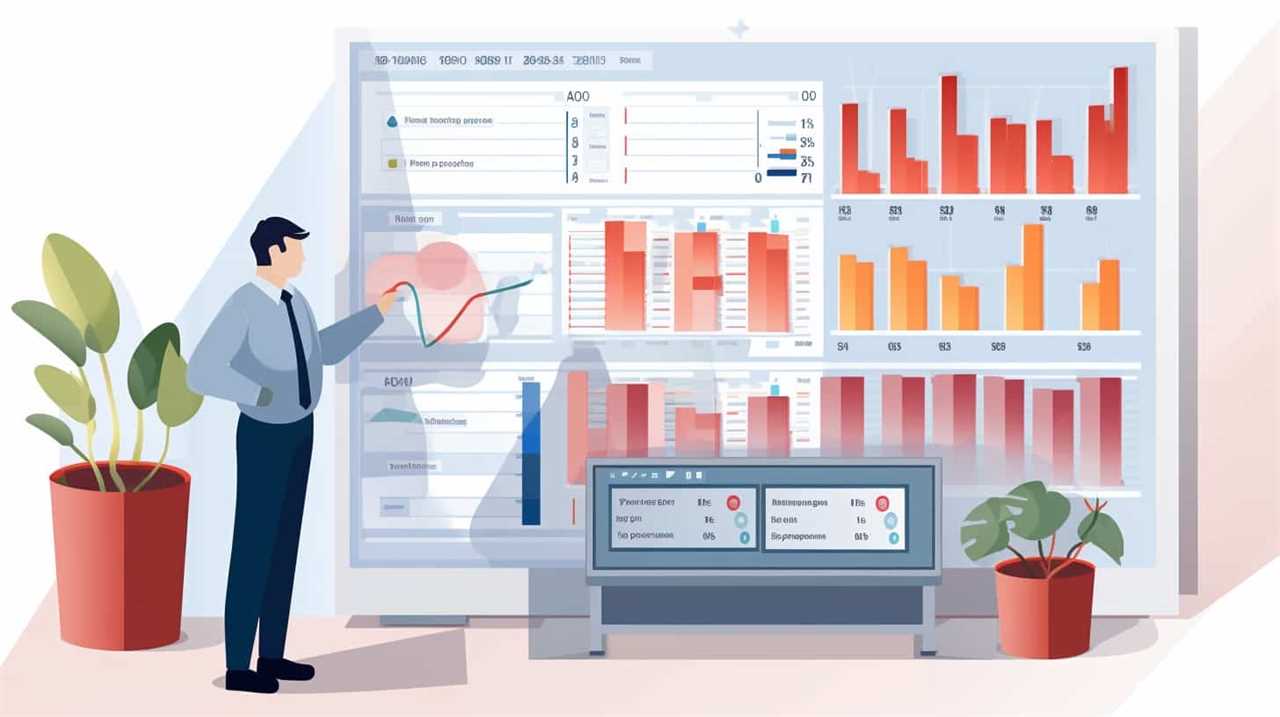
Understanding the Different Types of Heat Pumps for Green Homes
As we delve into the topic of understanding the different types of heat pumps for green homes, it is important to note that there are several options available to homeowners. Heat pumps are a popular choice for heating and cooling homes efficiently while minimizing environmental impact. Let’s take a closer look at the different types of heat pumps commonly used in green homes:
| Type | Description | Benefits |
|---|---|---|
| Air Source | Transfers heat between the indoor air and outdoor air | Cost-effective, easy installation, suitable for moderate climates |
| Ground Source | Utilizes the stable temperature of the ground to heat and cool homes | Highly efficient, long lifespan, consistent performance |
| Water Source | Extracts heat from water bodies, such as lakes or wells | High efficiency, versatile applications, reliable performance |
Choosing the right type of heat pump for your green home depends on factors such as climate, available space, and budget. Additionally, it’s worth exploring heat pump installation rebates and incentives offered by local and federal governments to make your investment more affordable.
Maximizing Energy Savings With Proper Heat Pump Maintenance
By regularly performing proper heat pump maintenance, we can maximize energy savings in our green homes. Maintaining our heat pumps not only ensures their efficiency but also reduces our carbon footprint. Here are some heat pump maintenance tips and energy-saving practices to help us achieve optimal performance and energy efficiency:
- Clean or replace air filters regularly to improve airflow and reduce energy consumption.
- Keep the outdoor unit free from debris, such as leaves and branches, to maintain proper airflow.
- Schedule professional maintenance annually to check for refrigerant leaks, clean coils, and optimize system performance.
- Insulate the air ducts to minimize heat loss during the distribution process.
- Use a programmable thermostat to set temperature schedules and avoid unnecessary energy consumption.
Frequently Asked Questions
Can Heat Pumps Be Used to Heat Water in Addition to Providing Heating and Cooling for the Home?
Yes, heat pumps can be used for heating water as well as providing heating and cooling for the home. Using heat pumps for swimming pools and water heating offers numerous benefits, such as energy efficiency and reduced greenhouse gas emissions.
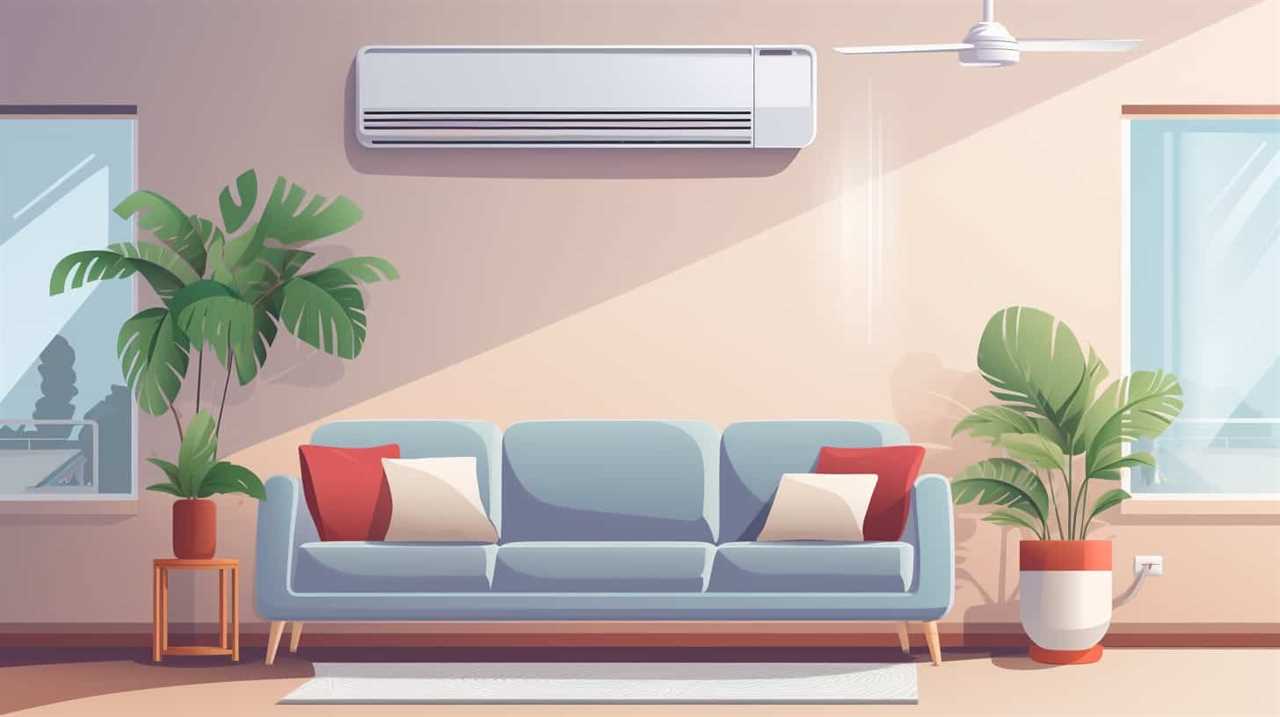
Are There Any Government Incentives or Rebates Available for Installing Energy-Efficient Heat Pumps in Green Homes?
Yes, there are government incentives, rebates, and tax credits available for installing energy-efficient heat pumps in green homes. These financial assistance programs aim to promote the use of energy-efficient technologies and reduce carbon emissions.
What Is the Average Lifespan of an Energy-Efficient Heat Pump?
The average lifespan of an energy-efficient heat pump is typically around 15 to 20 years. Regular maintenance tasks, such as cleaning and replacing filters, can help prolong its lifespan and ensure optimal performance.
Are There Any Specific Maintenance Tasks That Homeowners Can Do Themselves to Ensure the Optimal Performance of Their Heat Pump?
To ensure optimal performance of your heat pump, there are self-maintenance tips and troubleshooting techniques you can follow. Regularly cleaning or replacing air filters, checking refrigerant levels, and inspecting outdoor units are essential tasks.
How Does the Cost of Operating an Energy-Efficient Heat Pump Compare to Traditional Heating and Cooling Systems?
Operating costs comparison between energy-efficient heat pumps and traditional heating and cooling systems reveal significant energy savings. Our research shows that these green alternatives are not only eco-friendly but also cost-effective in the long run.
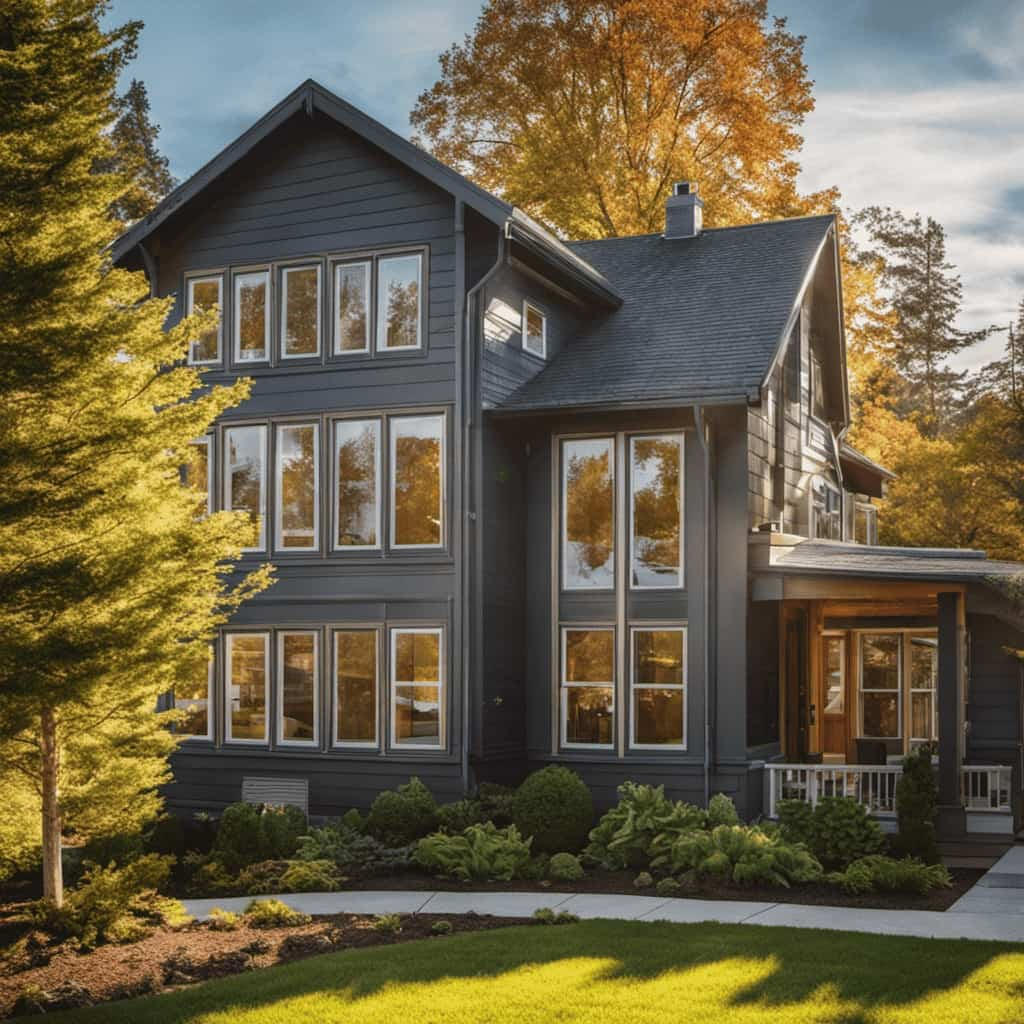
Conclusion
In conclusion, energy-efficient heat pumps are a vital component of green homes, providing sustainable heating and cooling. By understanding how they work and considering key factors when choosing a heat pump, homeowners can maximize energy savings.
Regular maintenance is also essential to ensure optimal performance and longevity. Just imagine a green home with a heat pump silently working, seamlessly providing comfort while minimizing environmental impact.
It’s a vision of a sustainable future that we can all strive for.
Air Conditioning
Heat Pumps Outperform Traditional Heating in Energy Use
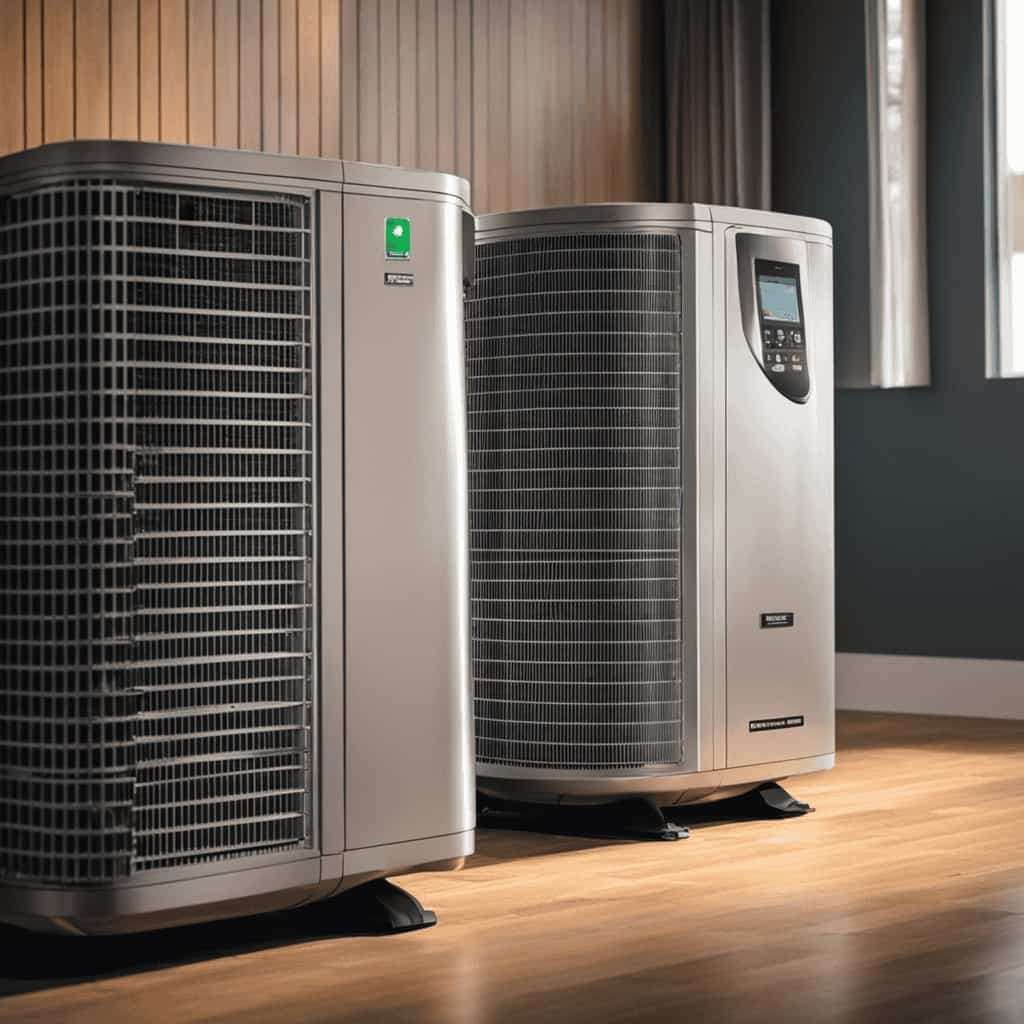
We have some thrilling news for you: heat pumps are surpassing traditional heating systems in terms of energy efficiency! Recent studies have demonstrated that heat pumps can greatly decrease electricity usage in comparison to traditional methods.
Not only that, but they also offer cost savings and have a lower environmental impact. So if you’re looking for long-term benefits and want to save money on your energy bills, heat pumps are the way to go.
Key Takeaways
- Heat pumps are more energy efficient compared to traditional heating systems.
- Heat pumps require less energy to heat a space compared to traditional heating systems, resulting in cost savings for the user.
- Heat pumps have a lower carbon footprint compared to traditional heating systems.
- Government incentives and rebates are available for installing energy-efficient heat pumps, further reducing the overall cost.
Energy Efficiency of Heat Pumps Vs. Traditional Heating Systems
We find that heat pumps are more energy efficient compared to traditional heating systems. Heat pumps use electricity to transfer heat from the outside air or ground into the building, making them highly efficient in terms of energy consumption. This means that they require less energy to heat a space compared to traditional heating systems, resulting in cost savings for the user.
Additionally, heat pumps have a lower carbon footprint compared to traditional heating systems. They don’t burn fossil fuels directly, reducing greenhouse gas emissions and contributing to a cleaner environment. This makes heat pumps a more environmentally friendly option for heating, aligning with the values of individuals seeking freedom to live in a sustainable and eco-conscious manner.

Electricity Consumption Comparison: Heat Pumps Vs. Traditional Heating
The electricity consumption of heat pumps is compared to that of traditional heating systems. To provide a clear analysis of electricity consumption, let’s compare the energy savings of heat pumps and traditional heating systems in a 3×3 table:
| System | Electricity Consumption | Energy Savings |
|---|---|---|
| Heat Pumps | Lower | Significant |
| Traditional Heating | Higher | Less significant |
As shown in the table, heat pumps have lower electricity consumption compared to traditional heating systems. This translates into significant energy savings for users. Heat pumps are designed to efficiently extract heat from the surrounding environment, making them more energy-efficient than traditional heating methods. By utilizing renewable energy sources, such as air, water, or the ground, heat pumps reduce reliance on fossil fuels and contribute to a greener and more sustainable future. With their superior energy efficiency, heat pumps are an excellent choice for those looking to minimize electricity consumption while maximizing energy savings.
Cost Savings With Heat Pumps: a Comparative Analysis
Comparing the cost savings of heat pumps to traditional heating systems provides valuable insights into the potential financial benefits of using heat pumps. When it comes to cost savings, heat pumps have a clear advantage over traditional heating systems. Here are some key points to consider:
-
Energy savings: Heat pumps are highly efficient and can save homeowners a significant amount of money on their energy bills. They can extract heat from the air or ground, making them much more energy-efficient than traditional heating systems.

-
Return on investment: While heat pumps may have a higher upfront cost, their long-term savings can make up for it. The energy savings over time can result in a positive return on investment for homeowners.
-
Lower operating costs: Heat pumps require less energy to operate compared to traditional heating systems, resulting in lower monthly utility bills.
-
Reduced maintenance costs: Heat pumps are generally low-maintenance, which means homeowners can save on costly repairs and maintenance fees.
-
Potential incentives: In many areas, there are government incentives and rebates available for installing energy-efficient heat pumps, further reducing the overall cost.
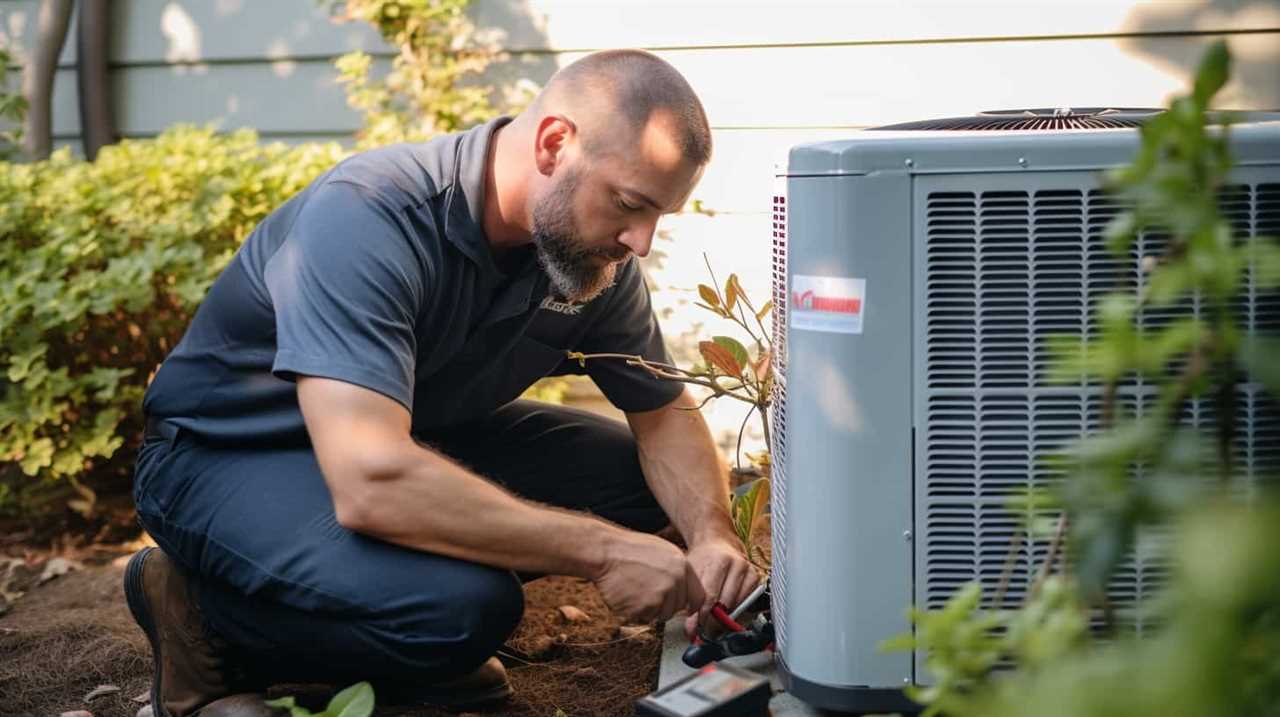
Environmental Impact: Heat Pumps Vs. Traditional Heating Methods
While traditional heating methods contribute to environmental degradation, heat pumps offer a more sustainable alternative. Heat pumps utilize renewable energy sources, such as the air or ground, to provide heating and cooling for homes and buildings. This means they produce fewer carbon emissions compared to traditional heating methods that rely on fossil fuels. By reducing carbon emissions, heat pumps play a crucial role in mitigating climate change and promoting a cleaner environment.
Additionally, heat pumps can be integrated with renewable energy systems, such as solar panels, further reducing reliance on non-renewable energy sources. This integration allows for a more efficient and environmentally-friendly heating solution.
Long-Term Benefits of Heat Pumps in Electricity Usage
As we consider the long-term benefits of heat pumps in electricity usage, it’s important to recognize that they significantly reduce energy consumption compared to traditional heating methods. This not only leads to cost savings in the long run but also contributes to energy conservation efforts.
Here are some key points to highlight:
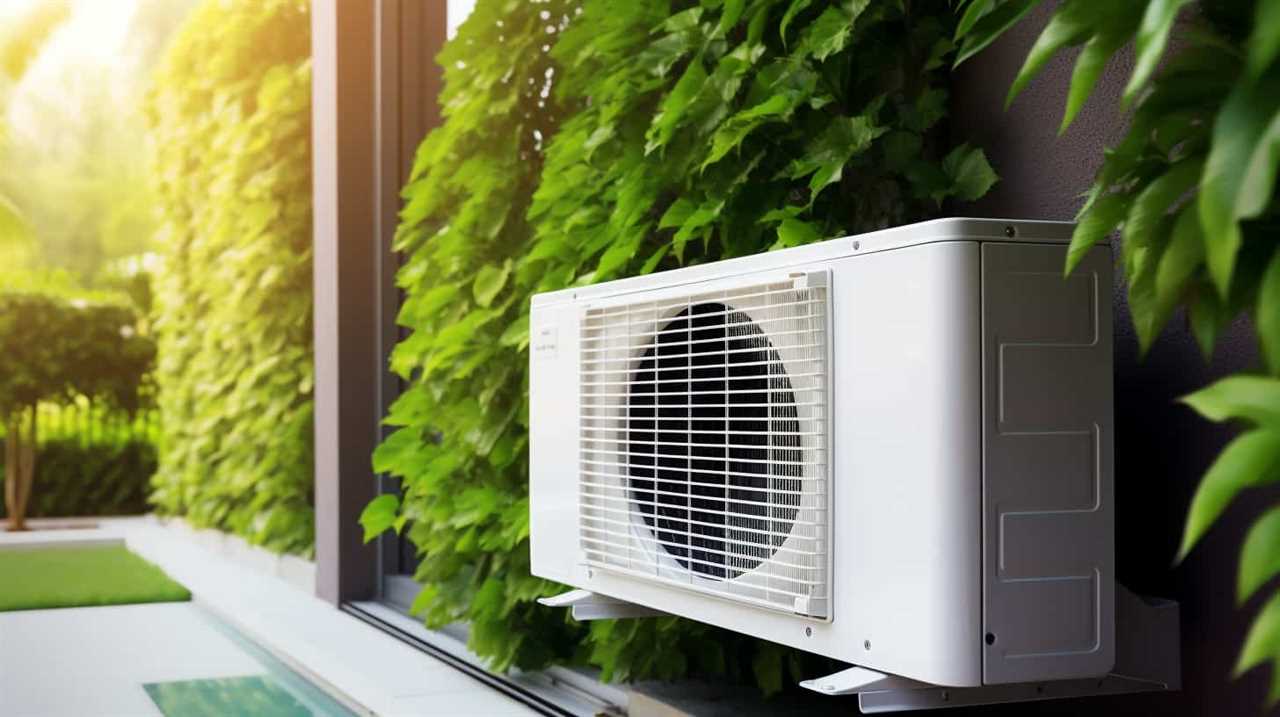
- Heat pumps are highly efficient in converting electricity into heat, resulting in lower energy consumption.
- By reducing energy usage, heat pumps help to lower electricity bills and provide long-term savings.
- Heat pumps have a longer lifespan compared to traditional heating systems, reducing the need for frequent replacements.
- The use of heat pumps can reduce greenhouse gas emissions, contributing to a cleaner environment.
- Heat pumps can be integrated with renewable energy sources, further reducing reliance on fossil fuels.
Frequently Asked Questions
What Are the Different Types of Heat Pumps Available in the Market?
There are several types of heat pumps available in the market. They include air source heat pumps, geothermal heat pumps, and hybrid heat pumps. Each type has its own advantages in terms of heat pump efficiency and benefits of heat pump technology.
How Do Heat Pumps Work in Cold Climates?
In cold climates, heat pumps work efficiently by extracting heat from the outside air or ground and transferring it indoors. This provides an energy-efficient heating solution, making heat pumps advantageous in cold weather.
Are Heat Pumps Suitable for Both Residential and Commercial Buildings?
Heat pumps are a cost-effective solution for both residential and commercial buildings. They not only provide efficient heating and cooling, but also offer environmental benefits by significantly reducing carbon emissions compared to traditional heating methods.
Can Heat Pumps Be Used for Both Heating and Cooling Purposes?
Heat pumps are a versatile solution for both heating and cooling. They offer several advantages for cooling, such as energy efficiency and lower operating costs compared to traditional cooling systems.
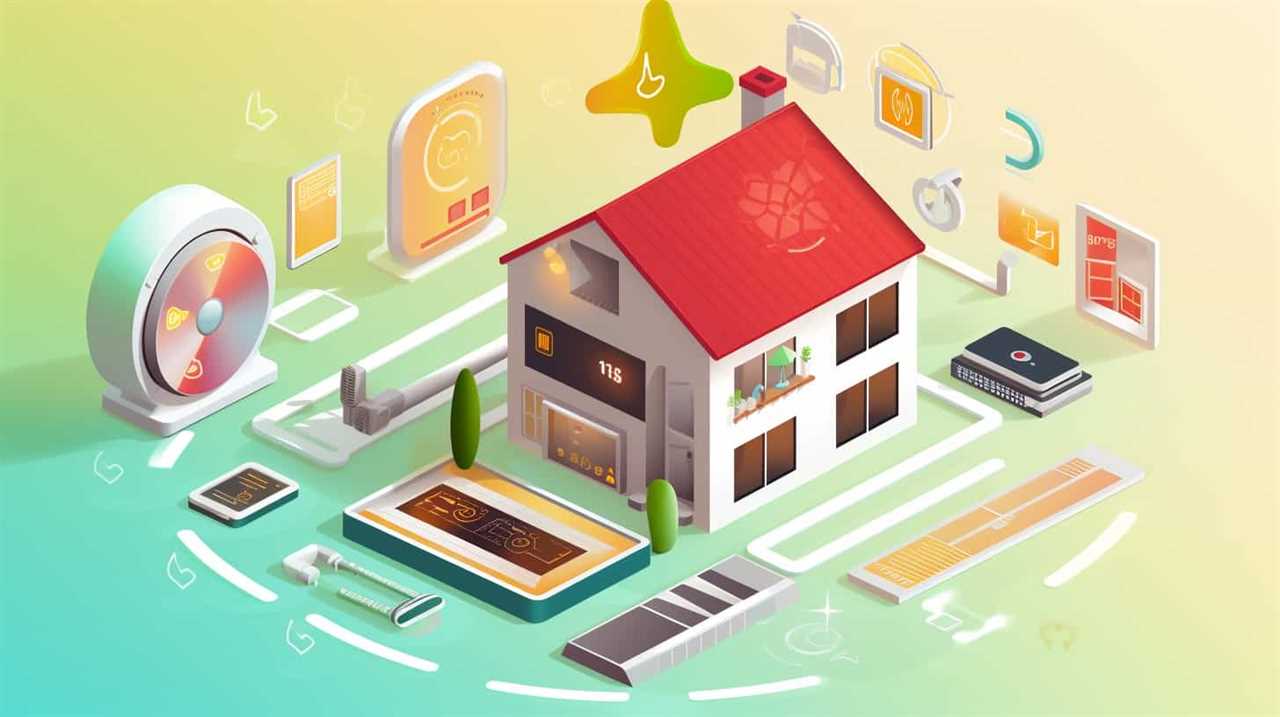
Are There Any Government Incentives or Rebates Available for Installing Heat Pumps?
There are government incentives available for installing heat pumps, which can help offset the cost. Heat pumps are known for their energy efficiency, making them an attractive option for those looking to save on heating and cooling expenses.
Conclusion
In conclusion, heat pumps have proven to be a superior option in terms of energy efficiency, electricity consumption, cost savings, and environmental impact when compared to traditional heating methods.
Their long-term benefits in electricity usage make them a smart choice for homeowners looking to reduce their energy consumption and carbon footprint.
Switching to heat pumps coincides with a greener future and a more sustainable way of heating our homes.
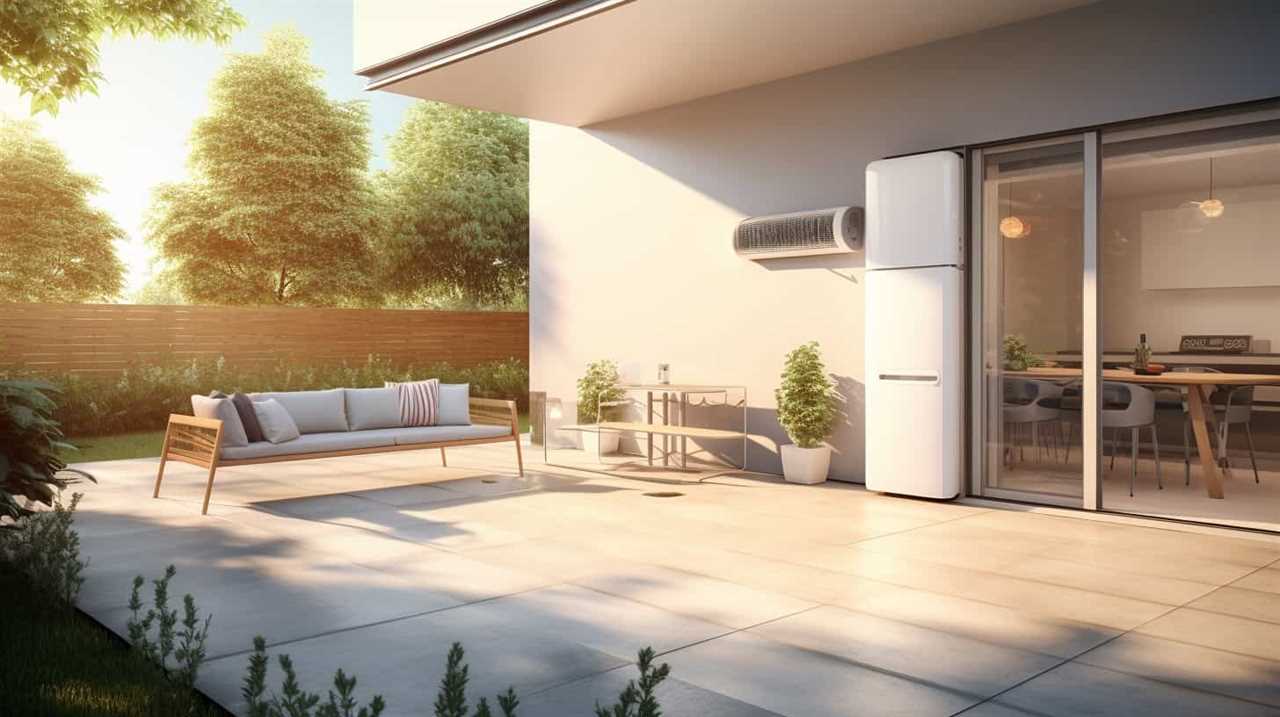
-

 Residential and Commercial Applications2 weeks ago
Residential and Commercial Applications2 weeks agoBest Amana Heat Pump Reviews
-

 Thermal Energy Transfer2 weeks ago
Thermal Energy Transfer2 weeks agoBreakthroughs in Modern Heat Pump Systems: Thermal Energy Edition
-

 Residential and Commercial Applications2 weeks ago
Residential and Commercial Applications2 weeks agoBest Heat Pump
-

 Geothermal Heat Pumps3 months ago
Geothermal Heat Pumps3 months agoUpgrade Your Comfort with Our Efficient HVAC Systems
-

 Air Conditioning3 months ago
Air Conditioning3 months agoExploring Energy-Efficient Air Conditioning Heat Pumps
-

 Geothermal Heat Pumps3 months ago
Geothermal Heat Pumps3 months agoInnovative Geothermal Heat Pump Manufacturers Revolutionize Energy Efficiency
-

 Thermal Energy Transfer1 month ago
Thermal Energy Transfer1 month agoBoost Your Heat Pump Efficiency: Interactive Guide
-

 Residential and Commercial Applications2 weeks ago
Residential and Commercial Applications2 weeks agoBest Portable Heat Pump Heat & AC










